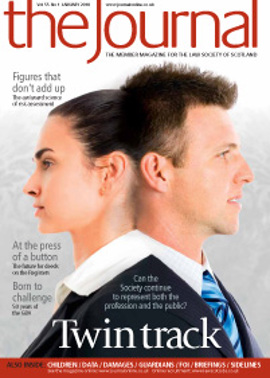Renewal of transitional guardianships

Did transitional guardianships of adults lapse on 5 October 2009 even though renewal applications had by then been lodged but not yet determined? No, but concerns may have been caused by the suggestion that they did in the surprising judgment of Sheriff Baird in G’s Guardian, uncritically described at Journal, November, 48. Is the drafting of relevant provisions of sched 4 to the Adults with Incapacity (Scotland) Act 2000 “execrable”, as suggested by the sheriff? That word was not used by the Society’s Mental Health and Disability Subcommittee when the proposed amendments to sched 4 were first introduced, but it did foresee such concerns and urged improvement. The response was that the legislative intent was that the powers of such guardians should continue at least until the renewal application was determined, and that this was achieved by the drafting, which was retained.
The relevant substantive provisions are contained in the amended sched 4, not the amended s 60, and they do achieve the legislature’s intention. They are opaque, but must be applied, not ignored.
All persons who were tutors or curators to adults on 1 April 2002 then became guardians under the 2000 Act, under para 1 of sched 4. Their authority to act as such continued, and will continue, until terminated in accordance with para 6(3A) or (3B). Chronologically, para 6(3B) came first, because it describes the situations in which transitional guardianships terminated prior to 5 October 2009. They terminated if that was a consequence of the terms of the original appointment (normally a time limit), or under relevant provisions in the Act, namely s 71 (replacement or removal of guardian, or recall of guardianship, by the court), s 73 (recall by Public Guardian or Mental Welfare Commission), s 75 (resignation of guardian) and an incomprehensible reference to s 79A (probably intended as s 77, dealing with the death of the adult).
Paragraph 6(3A)(a) covers the only situation in which a transitional guardianship terminated on 5 October 2009, namely where the guardian had not applied for renewal by that date. Under para 6(3A)(b), where the guardian applied for renewal and the application is refused, the guardian’s authority continued until the date of such refusal, and then ended. The remaining situation, under para 6(3A)(c), is where an application for renewal is granted. In that situation, the guardian’s powers continue not only until renewal, but thereafter until they end “in accordance with the provisions of this Act”, in other words until the renewal itself expires without being renewed in accordance with s 60, or where the guardian’s authority is terminated under s 71, 73, 75 or 77 – that is to say, broadly the same situation as previously applied under para 6(3B).
Paragraph 6(3A)(c) does not say that if the renewal application is granted, the guardianship should be retrospectively deemed to have terminated on 5 October 2009. It can only be interpreted as applying to the situation following grant of the renewal application (“where the person applies for such a renewal within that period; and the sheriff grants the application”). It would be absurd if under para 6(3A)(b) the guardianship continues until determination of the renewal application where renewal is refused, but were to be retrospectively deemed to have lapsed on 5 October 2009 where renewal is granted.
In the case of transitional guardianships, s 60 provides the mechanism for renewal, but all the circumstances in which the guardian’s authority ceases are provided for in sched 4.
Sheriff Baird was quite right, in the same judgment, to criticise the seriously defective rules which apply to “subsequent applications”, including renewals. I stated these and other criticisms in my annotation to s 60 in Adults with Incapacity Legislation. It is gravely disappointing that the Sheriff Court Rules Council has so far refused to rectify defective and outdated rules relating to adults with incapacity.
Adrian D Ward, Turnbull & Ward, Barrhead
EMLC website
I was delighted to read the positive parts of Iain Nisbet’s review of our website (Journal, November, 51), but did feel he was slightly harsh not to point out that the front page clearly states that the website is “under review”.
In common with many charities, especially in this climate, we have to cut our cloth carefully. Although we would dearly love to spend some of our funds on a full update of the website – especially further to the opening of our office in Edinburgh and our new projects in Highland and Aberdeenshire – changes to the site have to be a work in progress at present.
We would, of course, not discourage any readers or their firms from donating finances or the time of their web designers towards this project. Cheques and offers of help should be sent to our office at 41 St Vincent Place, Glasgow G1 2ER.
Joel Conn, Vice Convener, Ethnic Minorities Law Centre, Glasgow
In this issue
- Forward thinking
- Renewal of transitional guardianships
- End the navel-gazing
- Who speaks for lawyers?
- Reasons to be hopeful
- The full picture
- Hearing and speaking
- Law of unintended consequences
- More prejudicial than probative?
- One giant leap
- If the cap fits
- Half a century of strife
- From the Brussels office
- Law reform update
- Send in the SaaS
- Ask Ash
- Words and sentences
- Two in one
- Enough to turn you to drink
- Uncertain security
- Protections with legs
- Working for the estate
- Home defences
- Splitting from the taxman
- Scottish Solicitors' Discipline Tribunal
- Website review
- Book reviews
- Route to freedom
- Steady as she goes is market forecast






